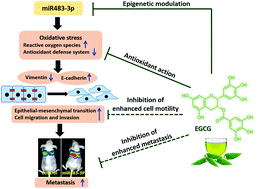Oral administration of EGCG solution equivalent to daily achievable dosages of regular tea drinkers effectively suppresses miR483-3p induced metastasis of hepatocellular carcinoma cells in mice†
Abstract
The effect of non-cytotoxic doses of epigallocatechin-3-gallate (EGCG) on the metastatic capability of human hepatocellular carcinoma (HCC) cells was investigated in vitro and in vivo. miR483-3p, a microRNA whose expression correlates inversely with survival and positively with disease progression in HCC patients, was found to promote HCC cell migration and invasion in vitro as well as lung metastasis in nude mice established by the tail-vein injection of HCC cells. The induction of reactive oxygen species (ROS) and downregulation of antioxidant defense factors Nrf2 and SOD2 appeared to be an important underlying mechanism and treatment with a non-cytotoxic dose of EGCG effectively reversed the miR483-3p-induced enhancement of HCC cell migration and invasion in vitro. Moreover, administration through drinking water at doses (0.1% and 0.5% EGCG solution, respectively) equivalent to the intake of regular to heavy tea drinkers could also significantly inhibit lung metastasis of HCC cells based on the estimation from the USDA Database for the Flavonoid Content of Selected Foods and FDA guidelines for the conversion of animal dose to human equivalent dose. EGCG also significantly counteracted the miR483-3p-induced alteration in the expression of epithelial–mesenchymal transition (EMT) markers, E-cadherin and vimentin, and downregulated the endogenous expression of miR483-3p in HCC cells through an epigenetic mechanism that led to the hypermethylation of the miR483-3p promoter region. The data from our study illustrate that miR483-3p promotes HCC metastasis likely through the induction of oxidative stress and uncover a novel role of EGCG for protection against miR483-3p-mediated HCC metastasis via the epigenetic modulation of miR483-3p expression. These findings therefore provide further evidence supporting that regular tea consumption may contribute to protection against miR-483-3p-induced ROS and the associated HCC progression.



 Please wait while we load your content...
Please wait while we load your content...